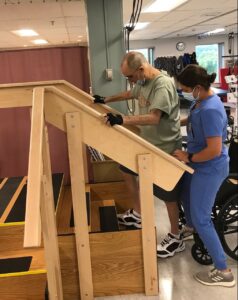By Colin McCandless, Contributing Writer

BRAINTREE – When Ralph was first accepted into Encompass Health Rehabilitation Hospital of Braintree, he had just been released from a nearby hospital’s ICU where he had spent more than a month on a ventilator battling a severe case of COVID-19. Being bedridden that long had left him weak and unable to walk or care for himself. He didn’t envision his life ever returning to normal.
Patients recovering from COVID-19 are one of the many life-changing illnesses and injuries that a rehabilitation hospital can help with. At Encompass, the most common patient groups include persons affected by stoke, brain injury, and neurological conditions such as Parkinson’s disease, as well as pulmonary and cardiac patients, according to business development director Dan Parkinson.
Interdisciplinary approach to care
Encompass, like all rehab hospitals, evaluates a set of criteria to determine if a patient meets medical necessity. Most patients are referrals coming from assisted living, home care or acute care hospital settings, but they do occasionally receive referrals from home.
If accepted into a rehab program, individuals are assigned a physician-led interdisciplinary team, typically consisting of CRRNs (Certified Rehabilitation Registered Nurses), case managers and dieticians, and physical, occupational, speech and respiratory therapists. At Encompass, internists, neurologists and physiatrists are also on staff. “We are a hospital level of care,” explained Parkinson. “It’s skilled intervention.”
The team develops personalized care plans that are communicated to the patient and their family. Every patient receives three hours of therapy per day, five days a week, spread throughout each day. Depending on the person’s diagnosis, this could entail occupational therapy, to assist with activities of daily living (ADL) such as bathing, dressing and feeding, and/or speech therapy, to help with swallowing, cognition, memory and communication (verbal and written). While physical therapy is part of recovery, “it’s not three hours straight of arm curls and leg lifts,” clarified Parkinson.
When Ralph began therapy, he couldn’t even lift a fork and required a mechanical lift to get out of bed. His clinical care team continued pushing him and within a few weeks, he started making strides. Ralph’s son, Mike, said his care team “put no limits on his recovery.”
The average length of stay at Encompass Health is two weeks, but upon patient release, a rehab can arrange continued services such as home care and follow-up appointments. “Our ultimate goal is to get people to return home and maximize their independence,” said Parkinson. “We’re not a nursing home. You’re going to work really hard, along with your family, to prepare to make it home safely.”
The interdisciplinary team ensures that the patient’s family is educated on their “level of need,” and participates in patient activities along with nurses and therapists. “We want to prepare the patient and their support system for a safe transition home,” noted Parkinson.
Along with Ralph’s unending motivation, and the extensive work with therapist, physician and nursing teams, he progressed further. One day, while working with his physical therapist on standing using parallel bars, he stood and walked right out of the parallel bars, transitioning to a walker.
Transitioning back to daily life

Another way rehab hospitals help with transitioning back to daily life is through the use of ADL apartments, a simulated home environment typically featuring a kitchen, a bathroom with a tub and a bedroom.
When a patient is ultimately discharged, the care team meets with the family to determine their needs and coordinates with the rehab hospital’s partners to ensure the patient can obtain any equipment they might require, like hospital beds, oxygen tanks or walkers. “Families are then trained on how to safely and effectively use the equipment,” stated Parkinson.
After recuperating in rehab for two months, Ralph now has a positive outlook on his recovery and looks forward to riding his motorcycle by year’s end. His discharge celebration included receiving a celebratory red-carpet treatment. “His family rented him a limo for the ride home,” recalled Parkinson.
RELATED CONTENT:
I’m Still Here engages, gives hope to people living with dementia (fiftyplusadvocate.com)
Whatever your age, exercise is good for you (fiftyplusadvocate.com)
For healthy feet, take care of your overall well-being (fiftyplusadvocate.com)












